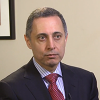Premier - Local Chiropractor
-
What is a concussion
What is a concussion? A concussion is a type of traumatic brain injury—or TBI—caused by a bump, blow, or jolt to the head or by a hit to the body that causes the head and brain to move rapidly back and forth.
-
The Patient's Role in Recovery from Concussion
A key component of treating concussion has to do with a patient’s engagement in rehabilitation. That active engagement in rehabilitation is crucial to achieving the successful outcomes that absolutely can be achieved in concussion rehabilitation.
Some of the barriers to that active engagement can often be mood, and those mood-related issues can come about because of challenges that have come up for an individual, a sense that they should be able to handle the things that are their norm in their day-to-day function.









